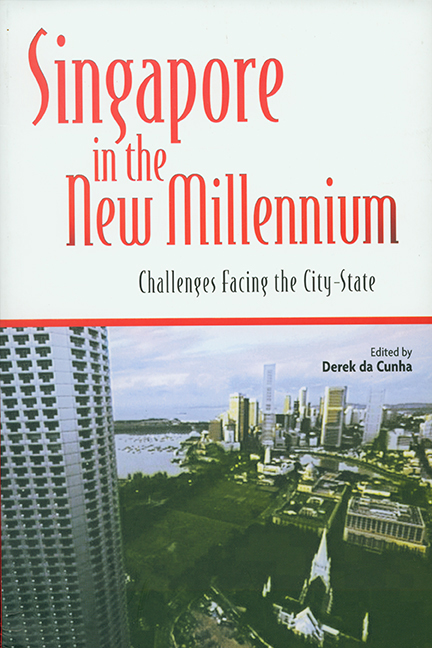Book contents
- Frontmatter
- Contents
- Preface
- Contributors
- 1 The Limits of a City-state: Or Are There?
- 2 External Challenges Facing the Economy
- 3 Governance: Its Complexity and Evolution
- 4 The Future of Civil Society: What Next?
- 5 Relating to the World: Images, Metaphors, and Analogies
- 6 Relating to the World: Images, Metaphors, and Analogies
- 7 Education in the Early 21st Century: Challenges and Dilemmas
- 8 Reframing Modernity: The Challenge of Remaking Singapore
- 9 National Identity, the Arts, and the Global City
- 10 The Media and the Flow of Information
- 11 Conclusion
- Index
2 - External Challenges Facing the Economy
Published online by Cambridge University Press: 21 October 2015
- Frontmatter
- Contents
- Preface
- Contributors
- 1 The Limits of a City-state: Or Are There?
- 2 External Challenges Facing the Economy
- 3 Governance: Its Complexity and Evolution
- 4 The Future of Civil Society: What Next?
- 5 Relating to the World: Images, Metaphors, and Analogies
- 6 Relating to the World: Images, Metaphors, and Analogies
- 7 Education in the Early 21st Century: Challenges and Dilemmas
- 8 Reframing Modernity: The Challenge of Remaking Singapore
- 9 National Identity, the Arts, and the Global City
- 10 The Media and the Flow of Information
- 11 Conclusion
- Index
Summary
IntroductionThough economists may disagree about whether globalization today is unprecedented compared with an earlier period a hundred years ago, there is broad consensus that the trend in the new millennium is towards greater integration of national economies across factor and product markets, fuelled by the rapid developments in information and communication technologies.
Globalization and the information and communications revolution, and their effects on Singapore and the city-state's responses to them, dominate discussions on the country's economic future. They are the key external challenges. This chapter examines three aspects of this debate — financial liberalization, attracting foreign talent, and the role of government intervention in the Singapore economy.
Financial Liberalization
Global Casino
Speculators may do no harm as bubbles on the steady stream of enterprise. But the position is serious when enterprise becomes the bubble on a whirlpool of speculation. When the capital development of a country becomes a by-product of the activities of a casino, the job is likely to be ill-done.
Lenin was right. There is no subtler, no surer means of overturning the existing basis of society than to debauch the currency. The process engages all the hidden forces of economic law on the side of destruction, and does it in a manner which not one man in a million is able to diagnose.
These two quotes exemplify the two worries on the globalization of capital markets for national economies — the capriciousness of capital and its capacity to wreak havoc with national currencies and domestic stability. Malaysian Prime Minister Mahathir Mohamad has, for instance, denounced the volatility of capital as a Western conspiracy to destroy the country's economy. He has likened foreign speculators to “rogues” and “scoundrels”. The Soeharto government in Indonesia at the height of the Asian crisis had accused foreign speculators of subversion, a crime that it pointedly confirmed was a capital offence. This sentiment was also shared by the Chavalit government in Thailand, although, unlike Indonesia, it did not make clear that speculators ought to be hanged.
- Type
- Chapter
- Information
- Singapore in the New MillenniumChallenges Facing the City-State, pp. 26 - 49Publisher: ISEAS–Yusof Ishak InstitutePrint publication year: 2002

